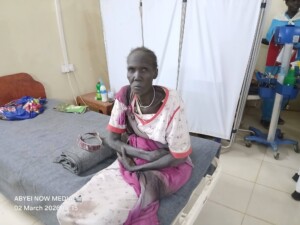Sudan mourns killed protesters, enters two-day ‘comprehensive strike’
Anger and sadness prevailed throughout Sudan after seven demonstrators were killed and more than 100 were wounded during the March of Millions on Monday. The country witnessed an overall quiet yesterday, as most of the Sudanese joined the two-day campaign of civil disobedience called for by the resistance committees. A number of cities witnessed street protests against the “January 17 massacre”.
 A road block in Northern State, January 18 (Social media)
A road block in Northern State, January 18 (Social media)
Anger and sadness prevailed throughout Sudan after seven demonstrators were killed and more than 100 were wounded during the March of Millions on Monday. The country witnessed an overall quiet yesterday, as most of the Sudanese joined the two-day campaign of civil disobedience called for by the resistance committees. A number of cities witnessed street protests against the “January 17 massacre”.
On Monday evening and Tuesday morning, the bodies of the protesters killed in the Sudanese capital were buried. Thousands of people offered their condolences, amid great anger.
In protest to the excessive use of violence by government forces against the demonstrators on Monday, the resistance committees active in the neighbourhoods and villages of Sudan called for an immediate comprehensive two-day campaign of civil disobedience.
The Forces for Freedom and Change alliance of opposition parties, the Sudanese Professionals Association, the driving force behind the 2018 December uprising, and more than 20 professionals’ associations in various sectors (health, education, banking, engineering, services, commerce and industry), affirmed their support to the nationwide strike.
Khartoum witnessed a near-complete paralysis on Tuesday. Most of the public transportation was suspended, though the authorities opened the Mak Nimr Bridge connecting central Khartoum with Khartoum North (Bahri), after a closure, with shipping containers, of more than a week.
Protests, road blocks
In El Obeid, capital of North Kordofan, Ed Damazin, capital of Blue Nile state, and in Kassala town, people took to the streets on Tuesday, denouncing the excessive violence used against protesters on Monday. The demonstrators carried pictures of the seven “martyrs”. Secondary school students in Khartoum North (Bahri) also went out in demonstrations. They condemned the January 17 massacre and said they’ll refuse to sit for their final exams.
Activists barricaded the main roads in greater Khartoum on Monday evening. Colleagues of Osman El Shareef, killed during the March of Millions against the military rule on Monday, closed their shops in the El Sajana market in Khartoum to mourn his soul. In eastern Sudan’s El Gedaref, members of resistance committees blocked roads in the state on Tuesday, “to protest the military rule, and mourn the martyrs of the massacre”.
Activists in El Hasaheisa, El Gezira, blocked the Khartoum-Wad Madani highway in protest against the January 17 massacre. Protester Mudawi Diaeldin (19) who was shot dead in Khartoum on Monday, came from Hasaheisa, Ashraf Khojali, member of the town’s local committee told Radio Dabanga. “We are barricading the highway at several points, and preventing any entry and exit to El Hasaheisa,” Khojali reported on Tuesday. “We were even able to stop vehicles belonging to the army.
In northern Sudan, the resistance committees in El Borgeig and El Hafeer blocked the Sheryan El Shimal (Artery of the North) road leading to the Egyptian border at several places, in protest against the January 17 massacre in Khartoum.
Abdu Ali of the El Borgeig Resistance Committees told Radio Dabanga that they closed “the north-eastern artery linking Halfa, Dongola, and Khartoum, and the north-western artery that connects Argeen, Halfa, and Dongola”. He added that the sit-in of farmers blocking the highway in Ed Debba, set up on January 9 in protest against the increase of power tariffs, is continuing as well.
General strike
Legal advisors working for the Ministry of Justice suspended all legal services to state agencies until Thursday. In a statement yesterday, they demand the immediate lifting of the State of Emergency declared in the country and the nullification of all measures taken after the military coup d’état of October 25 last year.
The advisors stressed the unconstitutionality of the current Sovereignty Council, and urged “the instant transfer of power to a civilian government, agreed upon by the Sudanese people”. They further called for an immediate end to the violence government forces are using against peaceful demonstrators, “including the extrajudicial killings”, and justice for the victims.
The Forces for Freedom and Change, the Sudanese Teachers' Committee, the Sudanese Journalists' Network, the Sudanese Engineers Association, the Information and Communication Technology Union, the Preparatory Committee for the re-establishment of the Radiologists Syndicate, the Electronic Banking Services Workers Union, the Engineers Association, the Democratic Alliance of Lawyers, the Professional Union of University Lecturers the University Lecturers Committee, as well as the Sudanese Employers Union, and many more professionals associations announced their readiness to join the two-day general strike in the country.
Lecturers of the El Zaeem El Azhari University, the Imam El Mahdi University, the University of Khartoum, El Nilein University, and the Omdurman Islamic University separately announced they will suspend their work on Tuesday and Wednesday. The administrations of the University of Khartoum and the University of Sudan for Science and Technology on Tuesday announced the suspension of studies for two days.
‘Dangerous path’
The Central Committee of Sudan Doctors (CCSD) yesterday published the names of the seven protesters killed on January 17. Osman El Shareef (40) was shot in the pelvis and right thigh, Hasan Ibrahim (in his twenties) sustained bullet wounds to the pelvis and abdomen. Ishag Haroun (31), Seraj Abdallah (24) and Mohamed Nour (22) were hit in the pelvis, and El Haj Malik (21) and Mudawi Diaeldin (19) were shot in the chest.
Speaking to Radio Dabanga yesterday, Amira Mousa, leading member of the Sennar Resistance Committees, said they are mourning the protesters killed in Khartoum on Monday, and in particular Osman El Shareef, who is originally from Wad El Abbas in east Sennar.
In the weeks since the military coup on October 25 last year, Sudan has seen an unrelenting series of pro-democracy mass demonstrations, called by the Resistance Committees and opposition forces across the country. The street protests have consistently been met by violence from a strong military and security presence.
The death toll among civilians since the coup rose to 71 on Monday. Hundreds of protesters have been injured, hospitals have been raided, many activists and journalists have been assaulted and detained, women protesters have been have been raped, and an unknown number of people went missing.
The violence has prompted international condemnation and serious concerns about the human rights situation in the country.
Yesterday, the High Representative of the European Union for Foreign Affairs and Security Policy Josep Borrell warned that the use of excessive violence against civilians and the continued detention of activists and journalists, “puts Sudan on a dangerous path away from peace and stability and jeopardises the opportunity for a peaceful solution which the UNITAMS-led consultations could bring”.











 and then
and then